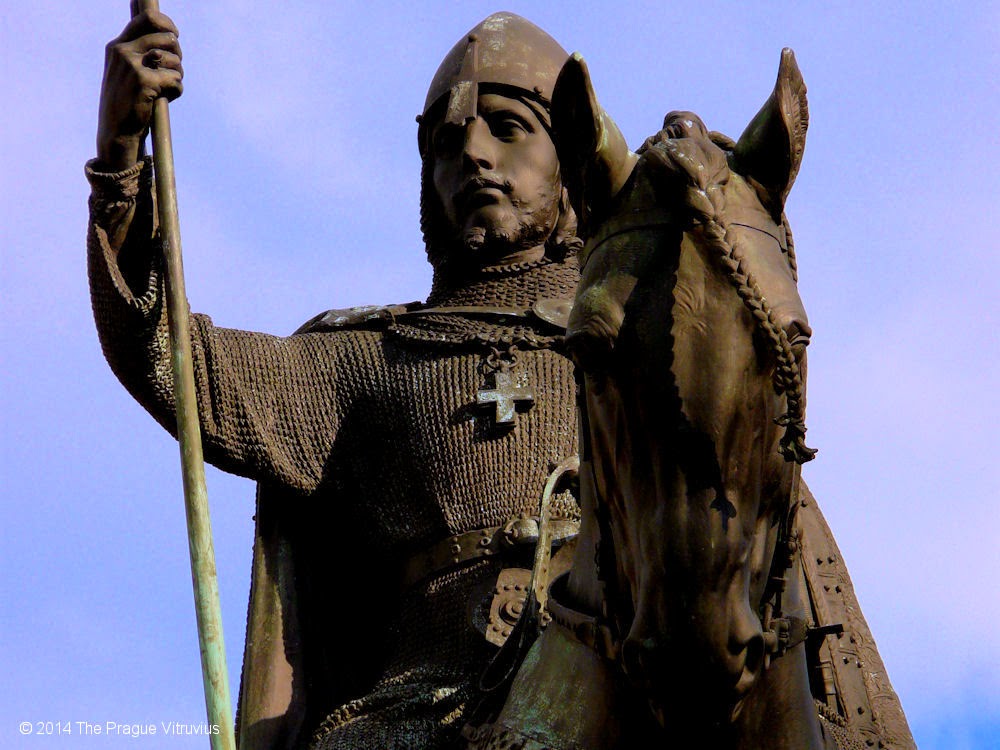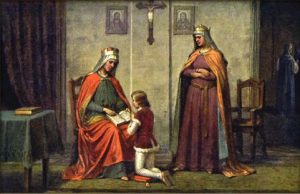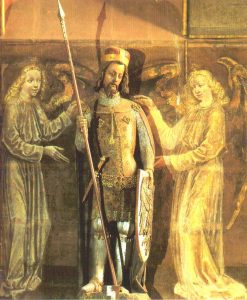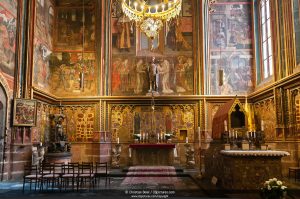
St. Wenceslaus was a duke during medieval times and a martyr for the Faith. Wenceslaus was born in the year 903 to the Christian Duke of Bohemia Wratislav and his wife Drahomira. Bohemia was a nation-state in central Europe, consisting of land which is mostly modern-day Czech Republic and Germany. Wratislav’s father had been converted to Christianity by the “Apostles to the Slavs”, Sts. Cyril and Methodius. Wenceslaus’ mother, Drahomira was the daughter of a pagan chieftain of a tribe to the north, and, although she was baptized at the time of her marriage, she never embraced Christianity. The family lived near Prague in the modern-day Czech Republic, and Wenceslaus had a brother, Boleslaus.
HOLY GRANDMOTHER

Wenceslaus was raised in the faith under the influence of his father and especially by his paternal grandmother, [St.] Ludmilla, who arranged for him to receive a Christian education at a college at Budec. There, he matured substantially both spiritually and academically. He was particularly devoted to the Blessed Sacrament. When he was just thirteen, his father Wratislav was killed in battle. At Wratislav’s death, Ludmilla became regent, placing her in control of the state of Bohemia until Wenceslaus came of age. Wenceslaus’s mother, Drahomira, however, saw her husband’s death as a grand opportunity to once again paganize the region. She was jealous of Ludmilla’s influence over her son and she challenged her authority, causing a terrible rift.
HATRED FOR THE CHURCH
Her distaste for Christianity became a hatred, and she arranged for Ludmilla to be murdered in her private chapel in 921. Thus, Drahomira became regent and she quickly set about to remove Christianity from Bohemia. She had churches closed, banned Christian education, and removed Christians from public office. Boleslaus, the brother of Wenceslaus, sided with his mother and supported her anti-Christian policies. This most unfortunate situation served to split the country into two factions. In 922, Drahomira was ousted from her rule by a popular uprising of the people. Now nineteen, Wenceslaus assumed control of the government and had his mother sent away. Although he would have much preferred to be a monk, he saw the need for stability, healing, and restoration in his dominion. Deeply devout, he strengthened his resolve through a penitential life, acts of charity, and especially through prayer. He invited German priests to come and serve and he restored the Latin rite over the Slavic, due to a lack of priests. He himself grew the wheat and the grapes needed for Mass, and he was given the relics of several saints by Holy Roman Emperor Otto I. He also had a Romanesque rotunda built at Prague under the patronage of the third century martyr, St. Vitus, of whom he possessed a relic. Always devoted in his faith, Wenceslaus attended Mass daily.
GOOD KING INDEED

As a ruler, he was strict but fair-minded, and was especially mindful of the needs of his people. Due to ongoing conflict with his brother, he split the country in two in order to keep the peace. Some of the influential nobility turned against Duke Wenceslaus, especially because of his alliance with the Germans. They gave their support to Boleslaus and Drahomira and conspired against Wenceslaus, and a plot was hatched.
MARTYR FOR THE FAITH
In September of 928, Boleslaus invited Wenceslaus, as a “gesture of peace”, to a banquet at his palace at Boleslayvia in honor of Sts. Cyril and Methodius. During this visit, Wenceslaus was in the chapel to visit the Blessed Sacrament when he was attacked by a group of Boleslaus’s companions, mortally wounding him. Boleslaus himself dealt the deathblow with a lance. Wenceslaus, only about age twenty-six at his death, was quickly venerated as a saint and a martyr. The Holy Roman Emperor Otto reacted to the murder by successfully invading Bohemia against Boleslaus, putting a halt to the anti-Catholic laws of Drahomira and Bolelaus. There is no indication that Drahomira ever regretted killing her own son or her mother-in-law, Ludmilla. Boleslaus, however, made aware of the many miracles taking place at Wenceslaus’s tomb, did repent, and in 938 had the remains transferred to a cathedral for public veneration.
St. Wenceslaus (Vaclav in Czech) was a good and just ruler, firmly grounded in his Christian principles. The story of his life and death spread throughout Europe and during the medieval times, he became the model of a “righteous king”. Emperor Otto did, in fact, bestow the title of king upon him posthumously. The twelfth century hymn, Saint Wenceslaus Chorale is still beloved by the Czech people. The nineteenth century Christmastime carol, Good King Wenceslaus, tells the story of a St. Stephen’s Day (December 26) journey that Wenceslaus made with an assistant to help a desperately poor peasant in a snowstorm.

His September 28 feast day is a national holiday in the Czech Republic., and His remains rest in a large magnificent chapel located within St. Vitus Cathedral in Prague.
